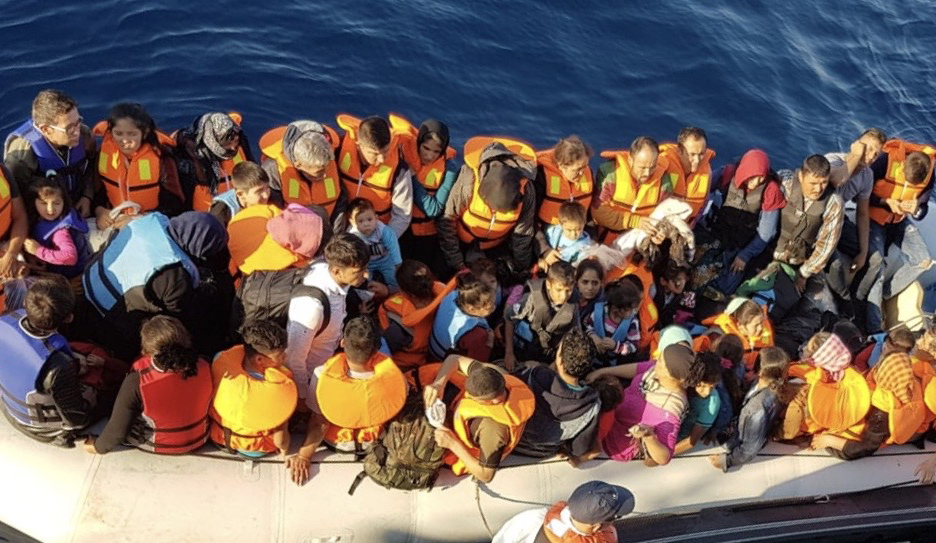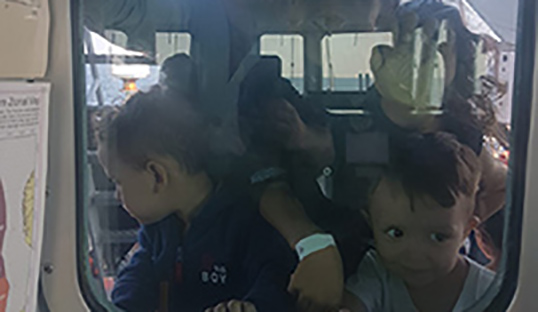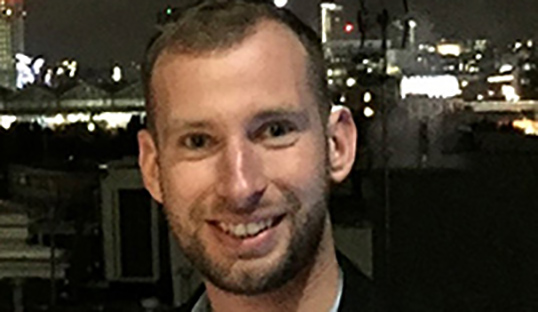'Rescuing desperate people changed my view of Europe's migrant crisis'
8 October 2020

Nautilus member Ross Cleland describes the human tragedy he witnessed as a third officer in the eastern Mediterranean, as countries closed their borders and turned their backs on international treaties
It was the summer of 2018 when I was first sent to the Greek Island of Lesbos to begin my work dealing with the migrant crisis that had been growing for several years. The island lies just a few miles from mainland Turkey in the eastern Aegean and is at the centre of Europe's migration crisis. You may remember in 2015 when three-year-old Syrian boy Alan Kurdi washed up dead on a Greek island's shores and the whole world was outraged? A simple Google search would now reveal that to be the norm, with the world steaming forwards blissfully ignoring the scale of human catastrophe.
I stepped off the aircraft in Lesbos to idyllic sunshine and spectacular mountain and coastal views and got a taxi to Mytilene, the island's capital. Mytilene is a bustling port which is well known for its bars and clubs just off the quayside. You'll also find it home to the Greek Coastguard and Frontex (European border police), with many different European nations all contributing assets to assist the Greeks in policing their waters. It was once home to some charities supporting the migrants, but they have now all left due to political pressure.
This was to be my place of work for the next year. I worked on a vessel with the aim of picking up migrants as they entered Greek waters and taking them back to the Greek coastguard compound to be processed by the relevant UN and Greek authorities. The crossings from Turkey to Greece happened at daybreak, so we were usually at sea during the early hours of the morning to ensure we were ready.
The EU and Turkey have a deal which means that the Turkish coastguard intercepts any boats they see leaving their coastline and returns them to Turkey with the migrants left disappointed, homeless and financially worse off. It's estimated that each migrant pays €5,000 to make such a trip. Yet every day, hundreds of people crammed into these boats manage to slip the net and make it to Greek waters.
It was 05:00hrs and the ship's alarms sounded, followed by a Tannoy announcement informing the crew that a migrant boat had been picked up on radar and was about to enter Greek waters. This was due to be my first experience with migrants. I was filled with adrenaline and completely unaware of what to expect. Everything I had ever seen was from the news and now it was me, at the centre of Europe's migrant crisis. The following hours changed my whole perception of everything I'd come to believe.

Honestly, previously to this I always thought 'Why does everybody want to come to Europe?', and 'Europe can't take the world's problems' and whilst this may or may not be true, what I was experiencing made me feel that there must be a better way.
On the horizon and through the morning haze I could see a speck in the distance, and as we got closer the true horror of the situation became more and more apparent. Luckily, the weather was quite good, as what we came across was a poorly constructed inflatable boat that was packed with about 80 individuals. The boat was probably intended to take a third of that capacity, and you could tell because of how low the boat was sitting in the waterline. There was water ingress in the boat, and it wouldn't have taken much more to turn the situation into a life and death one.
The following hours managed to turn my perception of the plight of the migrants on its head. I was confronted with very scared and very desperate individuals, the demographics of which consisted roughly of a third men, a third women and a third children. They were predominantly from Afghanistan and Syria (although other nationalities appeared from time to time) and constantly cried the words 'thank you'.
What I was experiencing made me feel that there must be a better way
One of my duties was to assist them from their overcrowded dinghy and onto the much larger vessel that I was on. I distinctly remember reuniting a mother with her newborn baby, born in the preceding days whilst they were sleeping rough in a Turkish forest. The mother grabbed her baby with one arm and grabbed my legs with the other whilst quite distressed and screaming 'thank you'.
I was shocked by the appalling physical condition that these people were in. Large numbers of them were covered in scars and open sores. When I asked about these, I was told that they regularly got bitten by sand flies whilst sleeping rough in the forest. One elderly lady grabbed me and kept pointing at her mouth, and clearly, she was in a lot of pain.
What also struck me was that all these people – some elderly and disabled or with young children – had no luggage. The occasional person had a bag, but I can't imagine leaving my whole life behind and travelling with just the clothes on my back.
The migrants that pulled at my heartstrings the most were the children. There were predominantly two types: the ones who were absolutely terrified of me when I tried helping them, and the ones who just wanted to run around and play. None of this was their fault. All they knew was a world of war and poverty, yet they still acted like any other child anywhere.
I remember being alongside one evening in Mytilene, where migrants regularly walked past and thanked us, since they were housed at a UN camp nearby in Moria. A camp built for 3,500 people but overcrowded with, at times, upwards of 10,000. The world turned a blind eye to its squalid conditions. I was upset to hear recently that the entire camp had burnt down, leaving all those housed there to sleep on the streets of Lesbos.
One evening I got chatting to this young lad from Iran. He was 18 years old and made the perilous journey to Europe alone. What struck me was how articulate this young man was, and how educated he appeared. I asked his story and it turned out his parents had discovered he was gay and he had been forced to flee the country as his father planned on killing him.
Apparently, it's better to have a dead son that a gay one, due to the shame it brings on the whole family. I really hope he makes a good life in Europe somewhere, and I'd love to track him down one day and find out what happened to him. This is just one of the many individual stories I heard.
My time in Greece came to an end when our very own UK migrant crisis started kicking off – one that I can't really go into much detail about. What I will say though is this. Imagine making a longer journey, across one of the world's busiest shipping lanes, in darkness, on a crowded boat, soaking wet and suffering from hypothermia. That was the case of every migrant boat I have come across trying to get to the UK. One boat I particularly remember was going in circles due to the dense fog and obvious lack of any visual bearings and certainly no basic navigational equipment. It's a miracle that there have been so few deaths.
Politics has a lot to answer for, but if you found yourself in the shoes of any of the people that I met, then what would you do?

Tags
